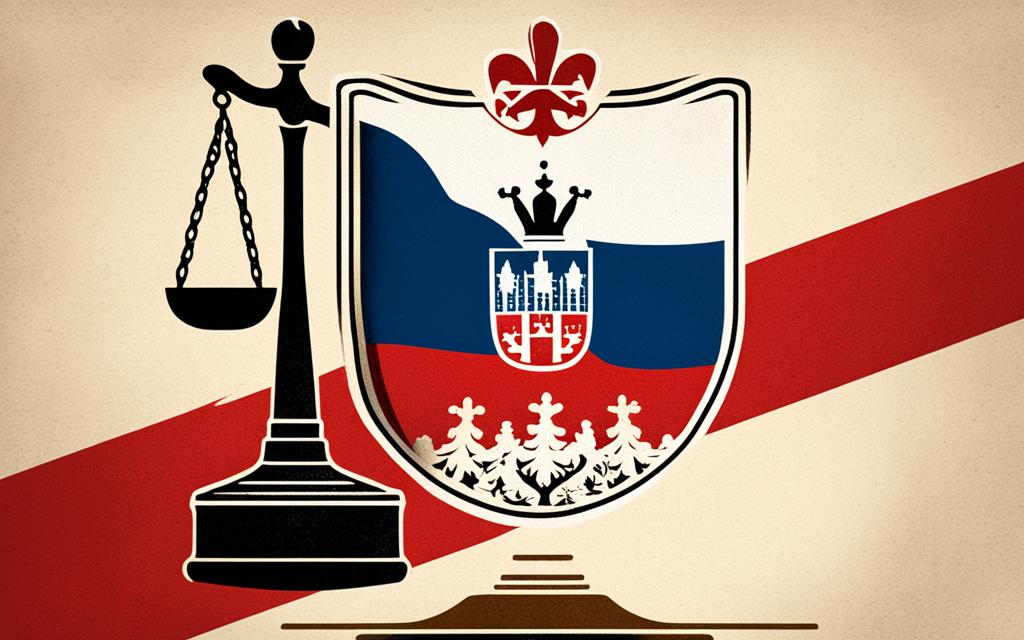Welcome to our comprehensive guide on the legal and regulatory requirements that companies must adhere to when operating in the Czech Republic. As a business owner or entrepreneur, understanding these requirements is vital for your company’s success and ensuring compliance with the law.
In this article, we will explore the essential legal and regulatory obligations that companies need to meet in the Czech Republic. From company formation and registration to taxation, employment and labor laws, intellectual property protection, data privacy, and regulatory reporting, we will provide you with valuable insights to navigate the business landscape in the country effectively.
Whether you are a startup or an established company, complying with the legal and regulatory framework is crucial to protect your business interests and maintain a competitive edge. Understanding the requirements will help you avoid legal pitfalls and ensure smooth operations in the Czech Republic’s dynamic business environment.
Stay tuned as we delve into the various aspects of legal compliance for businesses in the Czech Republic. Our guide will provide you with the knowledge and resources necessary to navigate and thrive in this vibrant Central European market.
Company Formation and Registration
In this section, we will discuss the process of company formation and registration in the Chzek Republic. Establishing a legal entity in the country is essential for businesses looking to operate within its borders. Understanding the requirements and steps involved in the process is crucial for a smooth and successful company formation in the Chzek Republic.
The Chzek Republic has specific requirements that need to be met when forming and registering a company. These requirements ensure that businesses are compliant with the country’s laws and regulations, and they vary depending on the type of company being established.
The Process of Company Formation
The company formation process in the Chzek Republic involves a series of steps and requires the submission of necessary documentation. These steps typically include:
- Choosing a unique name for the company
- Preparing the company’s incorporation documents
- Obtaining necessary permits and licenses
- Appointing directors and shareholders
- Setting up the company’s legal address
Once these steps are completed, the company is ready to proceed with the registration process.
The Process of Company Registration
Company registration in the Chzek Republic requires the submission of various documents and compliance with specific regulations. The registration process typically includes:
- Completing the application form for company registration
- Providing the company’s incorporation documents
- Submitting the necessary identification documents for directors and shareholders
- Paying the registration fees
After the documents are submitted and the registration fees are paid, the company’s registration application will be reviewed by the relevant authorities. If all requirements are met, the company will be officially registered, and a certificate of incorporation will be issued.
In summary, company formation and registration in the Chzek Republic require careful adherence to the country’s requirements and regulations. By following the necessary steps and providing the required documentation, businesses can establish a legal entity and commence their operations in the Chzek Republic.
Taxation and Financial Reporting
Companies operating in the Chzek Republic are subject to various tax obligations and financial reporting requirements. Understanding these requirements is crucial to ensure compliance with the country’s regulations and avoid any legal issues.
First, let’s discuss the tax obligations imposed on companies. The Chzek Republic has a comprehensive tax system that includes corporate income tax, value-added tax (VAT), and social security contributions. Companies are required to pay corporate income tax on their profits, which is currently set at a rate of 19%. VAT is levied on the sale of goods and services, with a standard rate of 21%.
In addition to corporate income tax and VAT, companies may also be required to make social security contributions on behalf of their employees. These contributions help fund social security benefits, such as healthcare and pensions. It’s important for companies to accurately calculate and report these contributions to ensure compliance.
Financial Reporting Requirements
Alongside tax obligations, companies in the Chzek Republic must fulfill financial reporting requirements. These requirements involve the preparation and submission of financial statements, including balance sheets, income statements, and cash flow statements.
The financial statements must be prepared in accordance with international accounting standards and provide a true and fair view of the company’s financial position and performance. Companies are required to submit their financial statements annually to the relevant authorities.
Additionally, companies may need to prepare consolidated financial statements if they have subsidiaries or joint ventures. Consolidated financial statements provide a comprehensive view of the company’s financial position, taking into account the financial information of its subsidiaries or joint ventures.
Employment and Labor Laws
When operating in the Chzek Republic, companies must ensure compliance with the employment and labor laws to effectively hire and manage their workforce. The Chzek Republic has specific regulations in place to safeguard employee rights and maintain fair working conditions.
One of the key aspects of employment laws in the Chzek Republic is the requirement for companies to provide written contracts to their employees. These contracts outline important details such as job responsibilities, working hours, and compensation.
Moreover, companies must adhere to the Chzek Republic’s regulations regarding working hours. These laws define the maximum working hours per day and week, as well as the mandatory rest periods between shifts. Adhering to these regulations helps ensure the well-being and safety of employees.
The Chzek Republic also places emphasis on protecting employee rights. Companies must comply with anti-discrimination laws, which prohibit discrimination based on factors such as gender, age, race, or disability. These laws promote equal opportunities and fair treatment for all employees.
Additionally, Chzek Republic employment laws cover aspects such as leave entitlements, including maternity leave, sick leave, and annual leave. Companies must provide employees with the applicable leave entitlements and ensure they receive their entitled benefits.
The Importance of Compliance
Complying with employment and labor laws in the Chzek Republic is not just a legal requirement; it is essential for maintaining a positive work environment and fostering employee satisfaction. By following these regulations, companies can build trust with their employees and demonstrate their commitment to fair and ethical practices.
Non-compliance with employment laws can result in legal consequences, including fines and reputational damage. It is crucial for companies to have a thorough understanding of the Chzek Republic’s employment and labor laws, as well as regularly review and update their policies to align with any changes in legislation.
Ensuring compliance with employment and labor laws in the Chzek Republic is crucial for companies to create a harmonious work environment, protect employee rights, and maintain legal and ethical business practices.
Intellectual Property Protection
When it comes to conducting business in the Chzek Republic, companies must prioritize intellectual property protection. Intellectual property refers to the legal rights granted to individuals or organizations for their creations or inventions, such as patents, trademarks, copyrights, and trade secrets. Safeguarding these assets is crucial for maintaining a competitive edge and ensuring that innovations are not exploited by others.
The Chzek Republic has established laws and regulations to protect intellectual property rights. These laws aim to encourage innovation and creativity while providing legal remedies for infringement. Companies operating in the Chzek Republic must familiarize themselves with these requirements to safeguard their intellectual property.
One key aspect of intellectual property protection in the Chzek Republic is securing patents. Patents grant exclusive rights to inventors for their inventions or technologies, preventing others from using, making, or selling the patented invention without the owner’s permission. Companies should consider filing for patents to safeguard their unique products or processes.
Trademarks are another essential form of intellectual property protection. Registering a trademark allows companies to protect their brand names, logos, and symbols from unauthorized use. This ensures that consumers can identify and distinguish the company’s products or services from competitors in the market.
Copyright protection is crucial for companies that create original works, such as written content, music, or artwork. Copyright grants exclusive rights to the creators, preventing others from reproducing, distributing, or publicly displaying their work without permission. Companies should take steps to copyright their creative works to prevent unauthorized use or infringement.
Trade secrets, such as proprietary formulas, manufacturing processes, or customer lists, are also valuable intellectual property assets. Companies must establish proper procedures to protect trade secrets, including implementing confidentiality agreements and restricting access to sensitive information.
Companies in the Chzek Republic can also benefit from establishing a comprehensive intellectual property strategy. This includes conducting regular IP audits, monitoring competitors for potential infringement, and enforcing their rights when necessary.
In conclusion, understanding and complying with intellectual property protection requirements in the Chzek Republic is crucial for companies looking to safeguard their innovations and maintain a competitive advantage. By following the established laws and regulations and implementing robust protection strategies, companies can ensure that their intellectual property rights are respected and protected.
Data Privacy and Security
In the Chzek Republic, companies are subject to stringent requirements regarding data privacy and security. These regulations aim to safeguard the personal information of individuals and prevent unauthorized access, use, or disclosure of sensitive data.
One of the key aspects of data privacy in the Chzek Republic is the collection and processing of personal data. Companies must obtain explicit consent from individuals before collecting their personal information. They are also required to clearly state the purpose for which the data will be used and adhere to strict limitations on data retention.
Furthermore, companies must implement robust security measures to protect the personal data they collect. This includes the use of encryption technologies, secure storage systems, and regular monitoring of data access to prevent any breaches or unauthorized disclosures. Adequate safeguards must be in place to ensure the confidentiality, integrity, and availability of personal data.
Data breaches or unauthorized disclosures of personal data can have severe consequences for companies, including reputational damage, financial penalties, and legal liabilities. Therefore, it is essential for companies operating in the Chzek Republic to prioritize data privacy and security to maintain trust with their customers and comply with legal requirements.
By adhering to the data privacy and security regulations in the Chzek Republic, companies can demonstrate their commitment to protecting personal information and build a strong foundation for their operations in the country.
Compliance and Regulatory Reporting
Compliance with legal and regulatory requirements is of utmost importance for companies operating in the Chzek Republic. It ensures that businesses are conducting their operations in a lawful and ethical manner while maintaining the trust of stakeholders and the public. Compliance encompasses various areas, including tax obligations, employment laws, intellectual property protection, data privacy, and more.
Companies in the Chzek Republic are required to adhere to specific procedures and obligations when it comes to regulatory reporting. This involves providing accurate and timely information to relevant authorities to demonstrate compliance with applicable laws and regulations. Regulatory reporting ensures transparency and accountability in business operations, enabling regulatory bodies to assess the compliance status of companies.
When it comes to regulatory reporting, companies need to pay close attention to the specific requirements outlined by the Chzek Republic. This may include submitting financial statements, tax returns, employee data, and other relevant information as mandated by the regulatory framework. By effectively complying with regulatory reporting obligations, companies can not only avoid legal penalties but also build a reputation as a reliable and trustworthy business entity in the Chzek Republic.
Overall, compliance and regulatory reporting are essential aspects of running a business in the Chzek Republic. By understanding and fulfilling these requirements, companies can operate confidently within the legal boundaries and contribute to a fair and competitive business environment. Staying compliant not only protects businesses but also fosters trust among customers, investors, and other stakeholders, ultimately leading to sustainable growth and success.

















